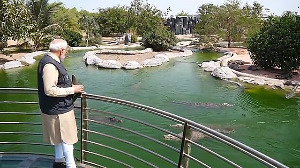Congress president Sonia Gandhi, who renounced prime ministership after 2004 polls, has said that India has taught her that politics is not just the art of possible, it can also be the 'art of the impossible.'
Delivering a lecture on 'Living Politics: What India has Taught Me' at the Nexus Institute in Tilburg, Netherlands, on Saturday, Sonia said: "The plain fact is that power for itself has never held any attraction for me."
"My aim in politics has always been to do whatever I can in my own way to defend the secular democratic foundation of our country and to address the concerns and aspirations of the many whose voice often remains unheard," she said.
The Institute is a leading Dutch think-tank, which organises lectures and conferences on political, cultural and philosophical topics. Nobel laureate Amartya Sen has delivered a lecture here.
Prime Minister of the Netherlands Jan Peter Balkenende hosted a dinner in honour of Sonia, who is visiting the country at the invitation of the Institute.
The Congress president prefaced her remark by saying that she has often been asked why she turned down the prime ministership after being unanimously elected as the party leader in Parliament.
"I always knew in my heart that if I ever found myself in that position I would decline the post of prime minister," she said, adding that she told her colleagues that 'it was dictated by my inner voice.'
"Indeed that voice has been my wisest guide in my political life," she said.
Turning to the issue of faster growth and social equity, she said, it was not a matter of choosing one over the other.
"Growth without equity leads to destabilise society while equity without growth simply cannot be sustained," she said.
Sonia said that democracy over the years had made India much more egalitarian but also gave new power to some old forces 'that thought to polarise and mobilise communities along religious lines.'
They threatened the very essence of India, the diversity of faith and cultures, languages and ways of life that have sprung from its soil and taken root in it, she said.
"The Congress... found itself in the midst of uncertainty and turmoil. In 1996, it lost the national elections. Pressure begins to build up...across the country urging me to emerge from my seclusion and enter public life," she added.
Describing the 'Incredible India.' she said: "It is a land that has given rise to four of the world's major religions. It is home to the world's second largest Muslim population. It welcomed Christianity long before Europe embraced it."
"It offered refuge to people fleeing from religious persecution, whether they be Jews or Zoroastrians. It is a land comprising different ecological and cultural regions, each with its own distinctive history. India is thus a multi-religional civilisation without parallel," she said.
She said India is a secular country.
"For us the term secularism means equal respect for all religions. Our nation is founded on the conviction that all Indians must be free to practice the religion of their choice, to speak and write in their native language to give expression to their own regional ethos and culture."
Sonia said the Indian experiment is a glorious example that unity can be also be based on the values of pluralism and multi-culturalism.






 © 2025
© 2025